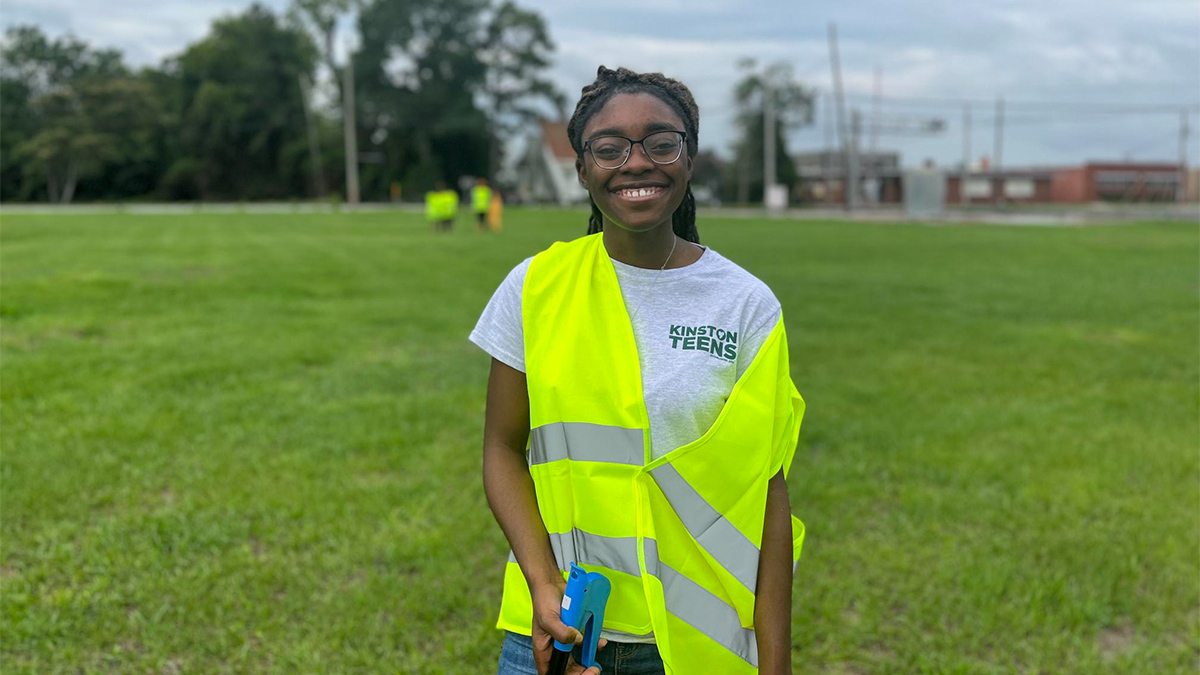Making an immediate impact
Carolina junior Nyjah King is spending her summer serving the Kinston, North Carolina, community as a SECU Public Fellows Intern.

Every summer, the Carolina Center for Public Service partners with nonprofit and government organizations to provide internship opportunities for UNC-Chapel Hill undergraduates who want to serve North Carolina.
The SECU Public Fellows Intern Program, started at UNC-Chapel Hill in 2020, pairs students with local leadership in paid internships to gain professional experience while benefiting rural North Carolina communities. This summer, junior Nyjah King is partnering with Kinston Teens, a youth-led nonprofit that empowers young people through service, leadership and civic engagement opportunities in Kinston, North Carolina.
King, who grew up less than 30 minutes from Kinston, was excited to work in a community similar to her own and partner with alumnus Chris Suggs ’21, who founded Kinston Teens as a high school student in 2014 and returned to his hometown to make a difference after graduating from Carolina.
“This is our eighth year, and we’ve really grown into an organization that is at the forefront of responding to a lot of timely issues,” Suggs said. “From the COVID-19 pandemic to hurricanes or flooding, we’re right there organizing volunteers, helping folks evacuate or assisting people with groceries and household goods.”
King helps lead leading engagement efforts to build Kinston Teens’ membership and volunteer base and also helps organize community events.
Continue reading to learn how King and the Carolina Center for Public Service program are helping to serve our state.
How did your time at Carolina help you expand Kinston Teens into a SECU Public Fellows Intern program opportunity?
Suggs: As I finished up my high school career, I knew I wanted to go to college and then come back home to Kinston. I chose to attend Carolina because, as an institution, it really values public service, between the education, curriculum, extracurricular activities, University leadership and the Tar Heel Bus Tour. I wanted to utilize the experiences and the things I learned in college to help improve Kinston.
Comparing Chapel Hill to Kinston put things into perspective: Chapel Hill is walkable and has public transportation, and there’s easy access to restaurants, grocery stores and medical facilities. In Kinston, a car is an absolute necessity to reach any basic services, which perpetuates health and food disparities in the community. Spending four years attending one of the best Universities in one of the state’s wealthiest zip codes and then returning home highlighted that contrast and pushed me to become more involved by joining the city council and expanding Kinston Teens.
How has the SECU Public Fellows Intern program and the Carolina Center for Public Service impacted Kinston Teens?
Suggs: The SECU program allows our organization to bring local talent back into the community and help them develop into young leaders that serve eastern North Carolina. Our interns help us create programs that impact lives. This summer, Nyjah has helped us grow and strengthen our membership base. That speaks volumes to the power of having dedicated folks working full time and supporting our work consistently.
Why did you choose to intern with Kinston Teens?
King: I’m from Jacksonville, which is less than 30 minutes away from Kinston. There are a lot of similarities, so it feels like I’m doing something that gives back to my community. They’re both rural, small towns that get hit by natural disasters and, until recently, were food deserts. When I first got this internship, I read about how they’re building Amazon warehouses and thought it would be this booming place. When I got here, I realized that the older section of town, where a majority of the Black population lives, isn’t receiving that kind of revitalization from outside sources, so it feels good to work in the community, host events and distribute masks and household items.
What aspect of your internship do you enjoy most?
King: I really like helping with member nights, which are bi-monthly events for our members to share food, drinks and music and just gather with other people in the community. I attended my first member night on my second day in the internship, and it was a great way to actually meet the people who are making an impact.
What have you learned as a SECU Public Fellows intern?
King: This has been a really great experience. I think it’s taught me a lot of openness and humility, and I’ve learned how to get to know other people and how best to help the community. It’s good to spend my summer doing something that really impacts people and helps others. I’ve been able to work directly with the community and see the changes we’re making, like the street clean-ups. One person can only do so much, but when the whole community gathers together and works on several blocks, you can see how it makes such a difference.
When I am on campus at Carolina, I feel like it’s easy to get caught in exams and papers and lose focus on future goals. All my plans with psychology and education seem so far away, and it feels like the only thing I can focus on is school and grades. Through this internship, I have had the amazing opportunity to directly help a community. Instead of simply learning about public service, I am living and working with an impactful organization. The work feels much more immediate and gratifying when you can see the direct impact.




